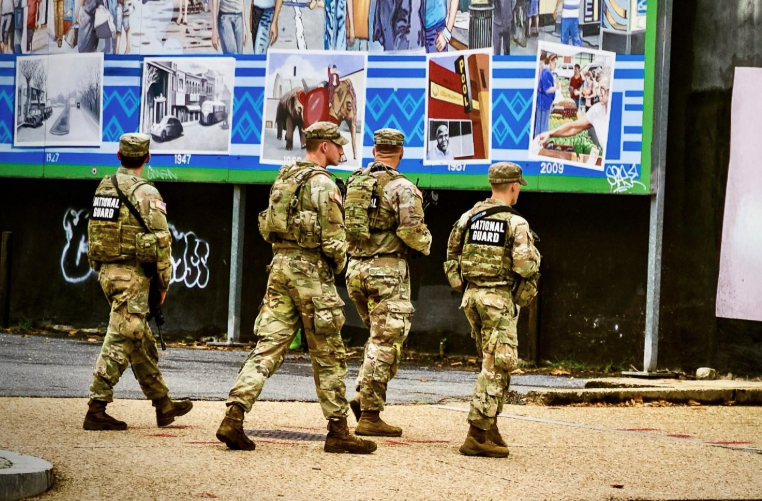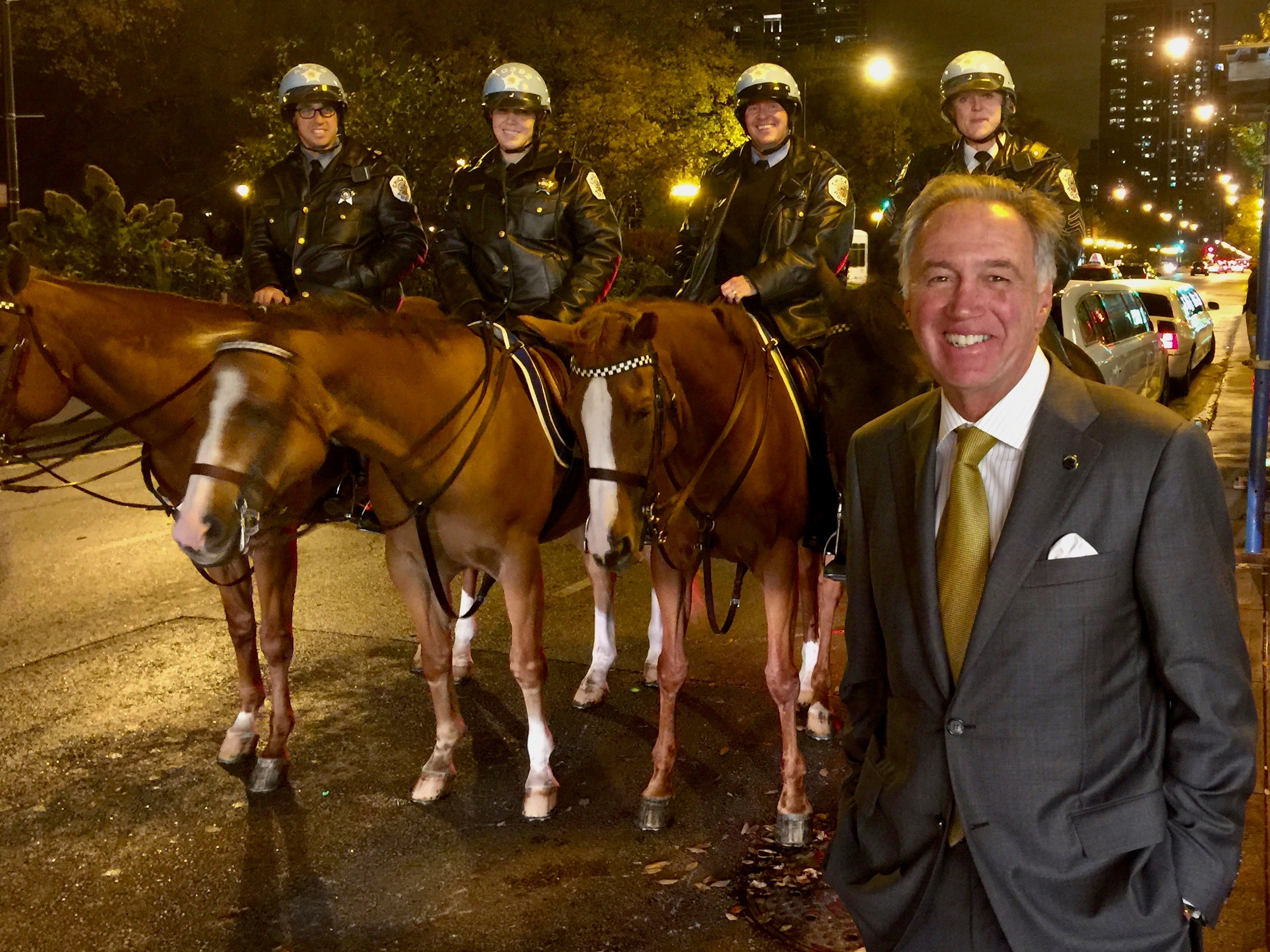|
October 11, 2025 The Rules of Engagement and Public Safety, and Remembering Rocco Diina
PERF members, This week I'm covering two issues: previewing what is sure to be a hot topic of discussion at next weekend's PERF Town Hall and remembering Rocco Diina, a dear friend of PERF and so many of our members. The Rules of Engagement and Public Safety Speaking last Sunday on ABC News, retired U.S. Army General Peter Chiarelli discussed rules of engagement and why they are so important to both the military and civilian police. The issue came up in the context of recent deployments of National Guard troops to Los Angeles, Washington, D.C., and other U.S. cities.
Members of the National Guard patrolling Washington, D.C. In the military, General Chiarelli explained, rules of engagement are designed to protect civilians and noncombatants and “provide proportionality for the use of lethality.” But when it comes to domestic peacekeeping, he added, “Our [armed] forces don’t train on a regular basis for that kind of duty and that kind of security. The rules of engagement for police are much different than the rules of engagement that we apply in combat. Police have a higher proportionality standard when applying those rules of engagement.” Over the years, local police departments across the country have honed their rules of engagement, especially in such critical areas as police use of force, protecting First Amendment rights, and working with the community to prevent crime. Now, in a growing number of cities, local police find themselves working alongside not only National Guard troops but also a surge of agents from various federal law enforcement agencies—Immigration and Customs Enforcement (ICE), Customs and Border Protection, the Federal Bureau of Investigation, and others. These troops and federal officers are being sent to communities they may be unfamiliar with, and they are being placed in uncharacteristically close contact with residents. Plus, their rules of engagement are undoubtedly different from those of local police. Next Sunday at the PERF Town Hall meeting in Denver, we will be examining this new environment and what it means for local police. There are many questions and issues that need to be addressed:
As I write this column, the cities of Portland and Chicago are grappling with these and related issues. Other cities could soon be joining them. That’s why we are carving out time at the Town Hall meeting to explore the new reality of local-federal relations and try to find some consensus and common ground in moving forward. It should be a lively discussion. I look forward to hearing your experiences and perspectives. Remembering Rocco Diina The policing community lost a good friend, an innovative leader, and a true gentleman this past week. Rocco Diina, former commissioner of the Buffalo Police Department (BPD), lost his battle with cancer at age 75. You can read his obituary here.
Rocco Diina. Rocco was pure Buffalo, through and through. Born and raised in the city, he joined the police department at age 18. As a police officer, Rocco was equally at ease arresting criminals and playing basketball with neighborhood youth. He was part of the special patrol that cleaned up a notorious neighborhood in the city, then was tasked with reinvigorating the area’s Police Athletic League. Rocco retired after 20 years with BPD and founded a security company in a basement office. That company, RJD Security, quickly grew to 900 employees and 130 clients, including the New York Yankees, the Metropolitan Opera, and the PGA. But policing remained in Rocco’s blood, and in 1994, he was coaxed out of retirement to become deputy commissioner in Buffalo. Four years later, he succeeded Gil Kerlikowske as commissioner, a position he held for seven years. It was a challenging time for Buffalo. Crime was increasing, and the city was in dire financial straits. But under Rocco’s leadership, the BPD was able to reduce crime while cutting costs. He did so by centralizing police districts, embracing new ideas and new technology, and instituting one-person patrols. You can only imagine what it must have taken to make that change in such a strongly unionized department as Buffalo. As good a police executive as Rocco was, I mostly remember him as being irrepressibly happy and engaging. You could always spot Rocco a mile away. His smile—it would catch your eye and say, “Hey buddy, how are you? Long time, no see.” And that name: Rocco. When he was born, his parents must have known he was something special, and Rocco just seemed to fit him. Rocco and I were both marathon runners back in the day, but as the years went by, we both became avid walkers—early morning walkers. On my walks before meetings of PERF or IACP or Major Cities Chiefs, I would invariably bump into Rocco, who was just as charming at 6 a.m. as he was at any other time of the day. Rocco was known for hosting dinners for an assortment of chiefs. These “Rocco Dinners” became famous. Rocco would go around the room, almost like the emcee at a roast, and tease each person he introduced. Rocco was in his element. One time Rocco invited me to speak at the local police foundation in Buffalo, where of course, the Bills reign supreme. Knowing my football allegiance, Rocco made sure to introduce me as a lifelong Patriots fan. He then stepped back, with that wonderful grin, to see both my reaction and the reaction of his audience to this interloper in enemy territory. The man always enjoyed a good laugh. Everyone who met Rocco remembered him. His charm was infectious; his humor, priceless. When Rocco became deputy commissioner, some criticized him for not having a college degree. So he went out and earned a degree in criminal justice. He was also a graduate of both PERF’s Senior Management Institute of Police and the FBI National Executive Institute. Rocco followed policing closely, and he was very engaged with PERF. Years ago, when some people were taking PERF to the woodshed over our work, Rocco stood up for PERF. He said he valued the principled stands we took and knew our policies and training could make a difference in policing. During challenging times, it was comforting to have Rocco Diina on your side. Rocco, we will miss your intellect, your camaraderie, your humor. And, of course, that winning smile. Best, Chuck
|


